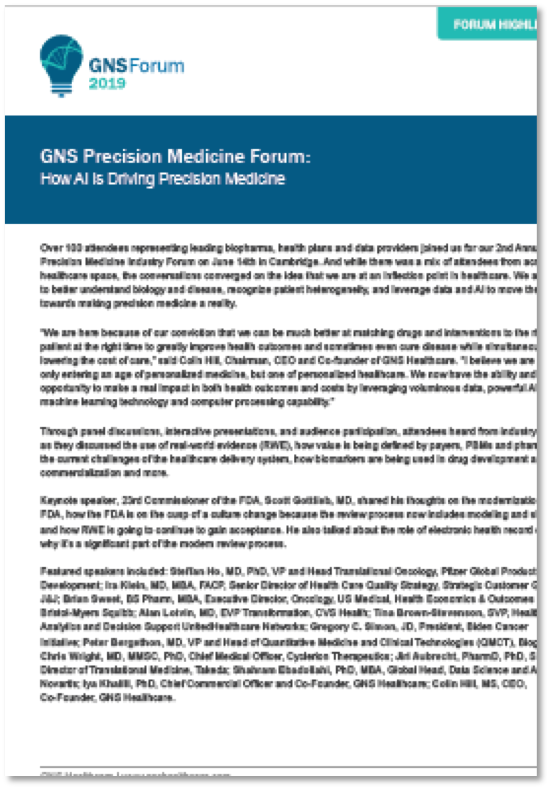
“How often have pharma, insurance and provider leaders thought about the ‘organizing principles’ around healthcare?”
That’s a question posed by Greg Simon, President of the Biden Cancer Initiative, at the recent GNS Precision Medicine Forum. His answer? Not enough. That was the overarching message of his presentation to the gathered group of healthcare industry leaders.
Organizing principles, the guiding ideas used to direct a society, organization or initiative are important because they create the framework and provide a consistent direction that propels a company, entity or industry toward its goals. So how is healthcare doing?
According to Simon, some of the ills inherent in the U.S. healthcare system can be traced back to flawed organizing principles. The road to addressing issues vexing the healthcare industry such as drug pricing concerns and clinical trial failures is to examine the foundation on which the industry was built. He stressed that now, when we are in the midst of a rapidly evolving system, is the perfect time to course correct the organizing principles for the new era of patient need.
The healthcare industry is moving from an era of chronic blockbuster drugs that address widespread common conditions such as high blood pressure to an era of curative drugs, focused on diseases impacting smaller subpopulations more effectively treated through a precision medicine approach. The problem, in Simon’s view, is that the current healthcare infrastructure is not designed to pay for, measure or evaluate patient care in this era because it is still based on chronic disease economics.
But he did not leave attendees without a path forward. He outlined four key areas where changing organizing principles can help fix what many consider to be a broken healthcare system.
Silos vs. collaboration
The major players in the healthcare system have remained divided: pharma develops drugs, insurance companies handle payment coverage, doctors provide medical care, and the patient is left to navigate among the three. One way to solve this silo organizing principle is to instead promote collaboration between the major healthcare entities.
For example, an insurance company can offer to fund a phase III trial that will potentially impact a significant number of their members in exchange for a long-term guaranteed lower price contract. This type of collaboration could lower the risks for both parties while helping to ensure that effective drugs become available for patients at reasonable costs.
Data sharing
Simon has found that when it comes to patient data, many physicians and institutions believe they know their patients and feel there is no need to share data. The first issue with that approach is that ultimately the data belongs to the patient not to the systems that hoard the data. Efforts are underway with the FHIR initiative to unlock these data silos, making it a default for patients to access their medical records as soon as they are available.
Secondly, as Simon puts it: one institution is not big data, a healthcare network is not big data, atmospheric movements across the globe – that’s big data. Relying on patient information from just one system or one network isn’t enough.
The Biden Cancer Institute is collaborating with entities who are creating new networks to share data. They are also working to develop a common language for pathology and diagnosis called MCODE – Minimum Common Oncology Data Elements. The goal of MCODE is to enable immediate translation of patient data from one EHR to another.
Co-Pays
Simon points out another problematic organizing principle - cost-sharing through co-pays for terminal drugs. He notes that the purpose of co-payments is to discourage over-utilization and encourage the purchase of generic vs. name brand drugs – neither of which is an issue when it comes to a singular life-saving drug common in the oncology and rare disease space.
Co-pays for these types of drugs usually aren’t a problem with Medicare, Medicaid and some private insurance plans. However, because the government allows patients to purchase less-than-optimal insurance plans, the co-pay issue has become an issue. He suggests that co-pays for terminal drugs should be eliminated.
Futures market
In terms of healthcare economics, Simon pointed out that health is the only asset class that is not organized as an asset class. It has been traditionally viewed as a cost with no assets. These days healthcare is a huge bundle of assets but is not treated that way. While other industries – like oil and gas – have created a financial market where investors can trade on futures thus stabilizing prices one of the most important industries is lagging behind.
Pharma is afraid of the future and charges higher prices today because they don’t know what is around the corner such as increased competition or development of generics. Conversely, insurance companies are fearful of the present, when a new, expensive drug may show up at any time. It’s no wonder we’re having trouble redefining the economics of healthcare. Establishing a futures market where healthcare companies can hedge their potential liability down the road will go a long way to stabilizing pricing in the industry.
The silver lining on the horizon? There’s still time to adjust and restructure our organizing principles for an efficient, cost-effective, and patient- centric system.
If you haven’t seen Greg Simon speak, you are missing out – his powerful passion, thought provoking candor and healthcare expertise is truly inspiring. We are so grateful he joined, our Forum and shared his unique vision on healthcare.
If you would like to learn more about our Forum, download our highlights here.



